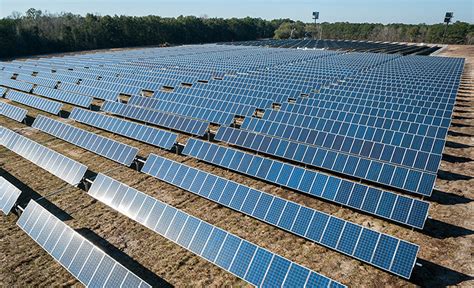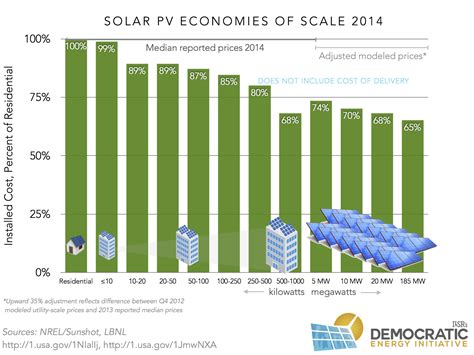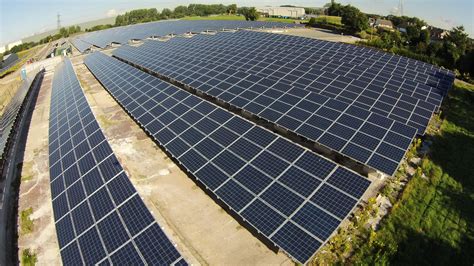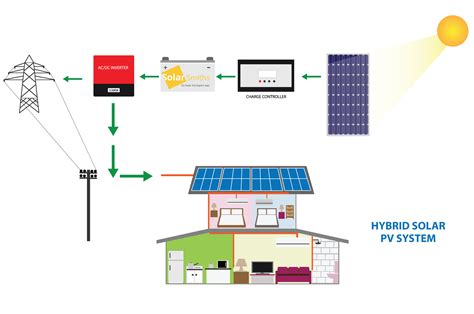The Environmental Impact of Solar Energy

Solar energy is a renewable source of power that has gained popularity in recent years due to its numerous benefits, including reducing reliance on fossil fuels and decreasing greenhouse gas emissions. However, like all forms of energy production, solar energy has environmental impacts that must be considered. In this article, we will explore the environmental impact of solar energy and discuss ways to mitigate its negative effects.
- The Environmental Impact of Using Solar Energy
- Environmental Impact of Solar Energy PDF
- Environmental Impact of Solar Energy Production
- Environmental Impact of Solar Energy on the Environment
- Positive Environmental Impact of Solar Energy
- Good Environmental Impact of Solar Energy
- Critique the Benefits, Costs, and Environmental Impact of Solar Energy for North Carolina
- Compare the Environmental Impact of Using Solar, Geothermal, and Nuclear Energy
- Solar Energy
- Geothermal Energy
- Nuclear Energy
- A Closer Look at the Environmental Impact of Solar and Wind Energy
- Solar Energy
- Wind Energy
The Environmental Impact of Using Solar Energy
When it comes to the environmental impact of using solar energy, the main concern is the manufacturing and disposal of solar panels. The production of solar panels involves the use of toxic chemicals and materials, such as lead and cadmium, which can leach into the environment if not properly managed. Additionally, the disposal of solar panels at the end of their lifespan can pose a risk to both humans and wildlife if not handled correctly.
Another environmental impact of using solar energy is the land use required for solar farms. Large-scale solar installations can take up significant amounts of land, which can disrupt ecosystems and habitats. In some cases, the construction of solar farms has led to deforestation and loss of biodiversity.
Environmental Impact of Solar Energy PDF
If you are looking for more in-depth information on the environmental impact of solar energy, there are several resources available in PDF format that delve into this topic. These PDFs typically discuss the various ways in which solar energy production can affect the environment, as well as potential solutions to mitigate these impacts. Some examples of PDFs on this subject include research papers, reports from environmental organizations, and government publications.
Environmental Impact of Solar Energy Production
The production of solar energy involves several processes that can have environmental consequences. For example, the mining of raw materials for solar panels, such as silicon and silver, can lead to habitat destruction and water pollution. Additionally, the transportation of these materials and the construction of solar panels can generate greenhouse gas emissions, contributing to climate change.
During the operation of solar panels, there is also the issue of land use and the potential for soil degradation. Solar farms can alter natural landscapes and disrupt ecosystems, particularly if located in sensitive areas. Proper siting and land management practices can help minimize these impacts, but they must be carefully implemented to be effective.
Environmental Impact of Solar Energy on the Environment
While solar energy is generally considered a clean and sustainable energy source, it is not without its environmental impacts. The installation of solar panels, particularly on a large scale, can have negative effects on the environment by altering landscapes, displacing wildlife, and disrupting ecosystems. Additionally, the manufacturing and disposal of solar panels can generate hazardous waste and emissions that contribute to air and water pollution.
It is important to consider these environmental impacts when evaluating the benefits of solar energy and to take steps to mitigate them through proper planning, design, and management practices. By doing so, we can ensure that the transition to solar energy is as environmentally friendly as possible.
Positive Environmental Impact of Solar Energy
Despite the potential environmental drawbacks of solar energy, there are also numerous positive impacts that should be considered. One of the most significant benefits of solar energy is its ability to reduce greenhouse gas emissions and combat climate change. By generating electricity from sunlight, solar panels can offset the use of fossil fuels and help to decrease the carbon footprint of energy production.
In addition to mitigating climate change, solar energy can also help to conserve natural resources and protect ecosystems. Unlike fossil fuels, solar energy does not require the extraction of finite resources or the destruction of landscapes through mining and drilling. Solar panels can be installed on rooftops, in deserts, and on other previously unused land, minimizing the impact on natural habitats.
Good Environmental Impact of Solar Energy
When properly managed and implemented, solar energy can have a positive impact on the environment. By reducing reliance on fossil fuels and promoting clean energy sources, solar power can help to decrease air and water pollution, protect wildlife habitats, and conserve natural resources. Additionally, the development of solar energy infrastructure can create jobs and stimulate economic growth while supporting the transition to a more sustainable energy system.
Overall, the environmental benefits of solar energy outweigh the potential drawbacks, making it a key component of the shift towards renewable energy and a greener future for the planet.
Critique the Benefits, Costs, and Environmental Impact of Solar Energy for North Carolina
When evaluating the benefits, costs, and environmental impact of solar energy for a specific region like North Carolina, it is important to consider the unique characteristics and challenges of that area. In the case of North Carolina, solar energy has the potential to provide numerous benefits, such as reducing electricity costs, creating jobs, and stimulating economic development. By harnessing the abundant sunlight in the state, North Carolina can significantly increase its renewable energy capacity and decrease its reliance on fossil fuels.
However, there are also costs and environmental impacts associated with solar energy development in North Carolina. The construction of large-scale solar installations can require substantial land use and may impact local ecosystems and wildlife habitats. Additionally, the manufacturing and disposal of solar panels can generate waste and emissions that must be properly managed to avoid negative consequences for the environment.
By carefully evaluating the benefits, costs, and environmental impacts of solar energy for North Carolina, policymakers, businesses, and communities can make informed decisions about the role of solar power in the state's energy future.
Compare the Environmental Impact of Using Solar, Geothermal, and Nuclear Energy
When comparing the environmental impact of using different forms of energy, such as solar, geothermal, and nuclear, it is important to consider the entire lifecycle of each technology. While all three sources of energy have the potential to reduce greenhouse gas emissions and promote sustainable development, they also have unique environmental impacts that must be taken into account.
Solar Energy
Geothermal Energy
Nuclear Energy
By comparing the environmental impact of using solar, geothermal, and nuclear energy, we can better understand the trade-offs and challenges associated with each technology. Ultimately, the goal is to transition towards a more sustainable and environmentally friendly energy system that prioritizes the protection of our planet and future generations.
A Closer Look at the Environmental Impact of Solar and Wind Energy
When examining the environmental impact of renewable energy sources like solar and wind power, it is clear that both technologies offer significant benefits in terms of reducing greenhouse gas emissions and promoting sustainable development. However, each technology also has unique environmental considerations that must be addressed.
Solar Energy
Wind Energy
Despite these challenges, both solar and wind energy offer clean and sustainable alternatives to fossil fuels that can help to mitigate climate change and protect the environment. By carefully managing the environmental impacts of renewable energy development and investing in innovation and technology, we can accelerate the transition to a greener and more sustainable energy future.
Learn More :
 The Future of Energy Sustainability: Harnessing Solar Energy
22 February 2024 by Admin
The Future of Energy Sustainability: Harnessing Solar Energy
22 February 2024 by Admin
As the world continues to face challenges in meeting energy demands while also reducing carbon emissions, the focus has turned to renewable energy sources. Among these sources, solar energy stands out...
 The Basics of Solar Energy
22 February 2024 by Admin
The Basics of Solar Energy
22 February 2024 by Admin
Solar energy is a renewable source of energy that is derived from the sun's rays. It is becoming increasingly popular as countries around the world strive to reduce their reliance on fossil fuels and ...
 Harnessing the Power of the Sun: A Sustainable Energy Solution
22 February 2024 by Admin
Harnessing the Power of the Sun: A Sustainable Energy Solution
22 February 2024 by Admin
The sun has long been a powerful source of energy for our planet. From providing warmth and light to supporting the growth of plants through photosynthesis, the sun plays a crucial role in sustaining ...
 The Economics of Solar Power Costs and Benefits
22 February 2024 by Admin
The Economics of Solar Power Costs and Benefits
22 February 2024 by Admin
As the world continues to face pressing environmental challenges, the need for renewable energy sources has become more urgent than ever. Solar power, in particular, has emerged as a promising alterna...
 The Impact of Solar Energy on Job Creation
22 February 2024 by Admin
The Impact of Solar Energy on Job Creation
22 February 2024 by Admin
Solar energy has become a major player in the renewable energy sector, with more and more countries turning to solar power as a sustainable and clean energy source. In addition to its environmental be...
 The Importance of Government Incentives for Solar Energy Adoption
22 February 2024 by Admin
The Importance of Government Incentives for Solar Energy Adoption
22 February 2024 by Admin
Solar energy has been gaining popularity as a clean and renewable source of energy that can help reduce our reliance on fossil fuels. However, the high upfront costs of installing solar panels can be ...
 Challenges and Solutions in Solar Energy Implementation
22 February 2024 by Admin
Challenges and Solutions in Solar Energy Implementation
22 February 2024 by Admin
Solar energy is a renewable source of energy that has gained popularity in recent years due to its environmental benefits and decreasing costs. However, there are still challenges that need to be over...
 Solar Energy Storage Solutions
22 February 2024 by Admin
Solar Energy Storage Solutions
22 February 2024 by Admin
Solar energy has become an increasingly popular renewable energy source in recent years. As technology continues to advance, more and more homeowners and businesses are turning to solar panels to powe...
 The Role of Solar Energy in Climate Change Mitigation
22 February 2024 by Admin
The Role of Solar Energy in Climate Change Mitigation
22 February 2024 by Admin
Climate change is one of the most pressing issues of our time, with the potential to greatly impact the future of our planet. As global temperatures rise and extreme weather events become more common,...
 The Rise of Solar Farms: Large-Scale Solar Power Generation
22 February 2024 by Admin
The Rise of Solar Farms: Large-Scale Solar Power Generation
22 February 2024 by Admin
Solar power has gained significant traction in recent years as a clean, renewable energy source that has the potential to revolutionize the way we generate electricity. Solar farms, also known as sola...
 The Role of Solar Energy in Commercial and Industrial Sectors
22 February 2024 by Admin
The Role of Solar Energy in Commercial and Industrial Sectors
22 February 2024 by Admin
Solar energy has become an increasingly popular source of renewable energy in recent years, particularly in the commercial and industrial sectors. With advancements in technology and decreasing costs,...
 The Application of Solar Energy in Residential Settings
22 February 2024 by Admin
The Application of Solar Energy in Residential Settings
22 February 2024 by Admin
Solar energy is a renewable source of energy that has gained popularity in recent years due to its numerous benefits, including its low environmental impact and potential cost savings. In residential ...
 Types of Solar Power Systems
22 February 2024 by Admin
Types of Solar Power Systems
22 February 2024 by Admin
Solar power systems are becoming increasingly popular as a renewable energy source. There are several different types of solar power systems available, each with their own unique features and benefits...
 The Importance of Solar Energy Conversion Efficiency
22 February 2024 by Admin
The Importance of Solar Energy Conversion Efficiency
22 February 2024 by Admin
Solar energy is a renewable and abundant source of energy that has the potential to meet a significant portion of our energy needs. With advancements in technology, solar energy has become more afford...
 The Role of Solar Energy in Space Exploration
22 February 2024 by Admin
The Role of Solar Energy in Space Exploration
22 February 2024 by Admin
Solar energy has played a crucial role in the advancements of space exploration. Since the beginning of space travel, solar power has been utilized to fuel spacecrafts, power rovers on other planets, ...
 Solar Power in Developing Countries
22 February 2024 by Admin
Solar Power in Developing Countries
22 February 2024 by Admin
Solar power, also known as solar energy, has become an increasingly popular source of renewable energy in developing countries. With the advancement of technology and the decreasing costs of solar pan...
 The Components and Construction of Solar Panels
22 February 2024 by Admin
The Components and Construction of Solar Panels
22 February 2024 by Admin
Solar panels are an essential part of renewable energy systems, converting sunlight into electricity. Understanding the components and construction of solar panels is crucial for anyone looking to inv...
 Photovoltaic Technology: How Solar Cells Work
22 February 2024 by Admin
Photovoltaic Technology: How Solar Cells Work
22 February 2024 by Admin
Photovoltaic technology, also known as solar cell technology, is a renewable energy source that converts sunlight into electricity. Solar cells are made of materials that exhibit the photovoltaic effe...
 Advancements in Solar Technology
22 February 2024 by Admin
Advancements in Solar Technology
22 February 2024 by Admin
Solar technology has come a long way in recent years, with new advancements being made constantly to improve efficiency, affordability, and accessibility. From advancements in solar panel technology t...